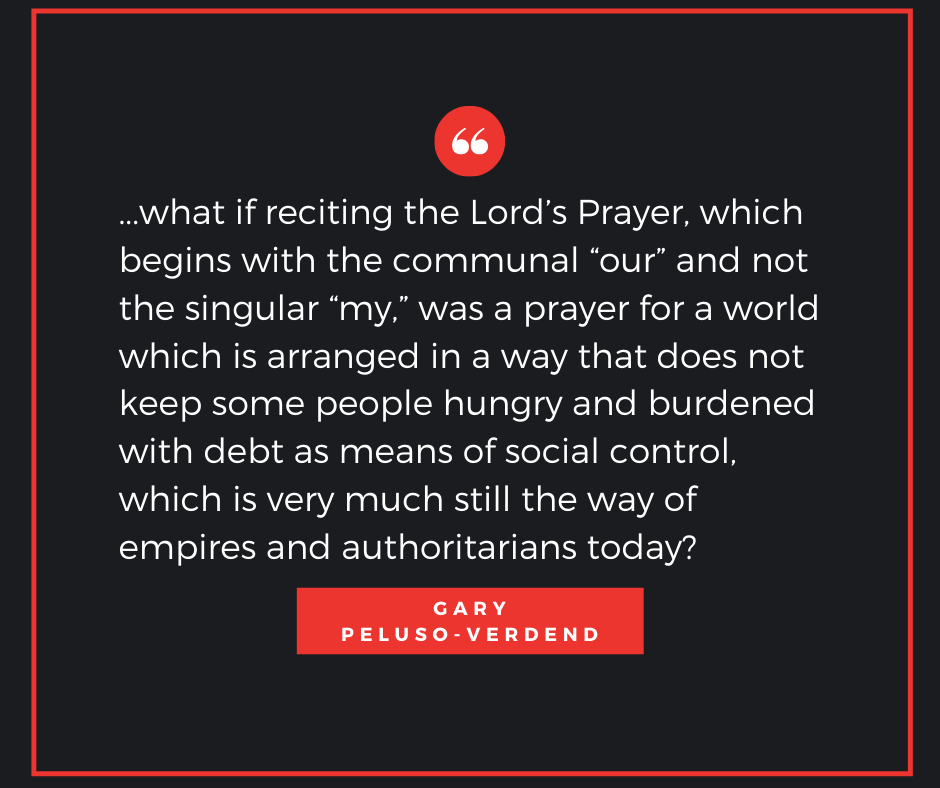The Lord’s Prayer is Christianity’s Most Dangerous Prayer
This past semester, I taught a class about the relationship between Christianity and democracy in the United States. Since there are multiple practices of both Christianity and of democracy, rooted in different founding narratives and value systems, studying “the relationship” is a complicated task.
One of my statements toward the start of the class was, “Jesus created a tension with which all Christians of all stripes must engage when he prayed ‘your kingdom come your will be done on earth as it is in heaven. The problem is: there is already a kingdom here that he is praying to be replaced. The current king—or whatever kind of ruler(s) we have—will not like being replaced.’”
The Lord’s Prayer may be the most dangerous prayer in Christianity’s prayer books, one that hundreds of millions of Christians recite weekly—and weakly. Inattentively. The prayer is dangerous because we have no idea what we are saying when, I would argue, we are asking that our world be turned upside down. And it is dangerous when we do know what we are saying, because there will always be rulers who don’t want their rule replaced.
Some Christians will object, “What danger? Jesus said his reign is not of this world. The message of Christianity is that Jesus is humankind’s universal savior.” Indeed, that is the good news many Christians understand as the core of the faith. The coming of the reign of God, they believe, refers either to a heavenly fulfillment or to a future event, popularly referred to as The Second Coming.
But there is that provocative, maybe inciting, phrase, “on earth as it is in heaven.” There is a “Now, right now!” vibe to this prayer that does not point to “someday.”
More than two centuries ago, scholars began to note more frequently than Western churches had that Jesus’ messages as presented in the Gospels differed from Jesus the Christ presented to the Roman world by Paul. These scholars saw that Jesus’ core message, like John the Baptist’s before him, was, “Repent—turn around, for the Empire of God is at hand, near, breaking into the present.” (The term in the Greek text of the New Testament often translated into English as “kingdom” is basileia, and basileia in the first century meant “empire,” the empire of Rome.)
Jesus the Messenger, wrote these scholars, was spread through the empire by Paul and his students as Jesus the Message. But Jesus’ message per se was the Empire of God—a close-by reality, quietly, in small ways, often unnoticed—breaking into this world and turning the Empire upside down which, in God’s eyes, is then rightside up. The last are first. The poor are blessed. The prisoner is freed.
In the 4th century, when Constantine legalized Christianity, one can imagine it was more likely that an emperor would cloak his realm with an otherworldly salvation religion, one that practiced works of mercy in this world while preparing for bliss in the next, than it would have been to embrace a religion with the central message: “God, please replace my empire with yours.”
What if we imagine our way back behind Constantine, behind centuries of spiritualizing prayers that shifted concrete circumstances to non-material goods? What if daily bread means we want bread sufficient for today’s hunger? What if “blessed are, or happy are, or exceeding blissful are” the poor who will receive the Empire of God means just that? What if “forgive us our debts” meant financial debts, as scholars now believe was the case for a people crushed and held in their places by the imperial economy?
 In other words, what if reciting the Lord’s Prayer, which begins with the communal “our” and not the singular “my,” was a prayer for a world which is arranged in a way that does not keep some people hungry and burdened with debt as means of social control, which is very much still the way of empires and authoritarians today?
In other words, what if reciting the Lord’s Prayer, which begins with the communal “our” and not the singular “my,” was a prayer for a world which is arranged in a way that does not keep some people hungry and burdened with debt as means of social control, which is very much still the way of empires and authoritarians today?
What if this world becomes, even if fleetingly, heaven on earth when everyone is fed, when debts are forgiven, when we resist the temptation to return evil for evil or violence for violence? What if the poor and the humble and the pure at heart really are the blessed ones, and the wealthy and those with dark hearts and those who return every insult tenfold are the lost?
Such a prayer would have consequences for one’s participation in a democratic republic.
The ways of earthly empires are unreal. That is the implication of praying the Lord’s Prayer.
What do imagine you are praying for if you pray the Lord’s Prayer, and how do you understand that prayer vis-à-vis the U.S.? Speaking for myself, I believe I am praying for a world—and a nation—that are not prepared to have their imperial or authoritarian ways challenged. I also believe the reign of God will not be fulfilled “in this age,” but it’s “almost here” presence will keep opening spaces for us human beings to live as if God’s reign of justice, inclusion, compassion, and love is the only real reality.
Dr. Gary Peluso-Verdend is president emeritus at Phillips Theological Seminary and is the executive director of the seminary’s Center for Religion in Public Life. The opinions expressed in this blog are those of the author. Learn more about the Center’s work here and about Gary here.


Comments are closed.